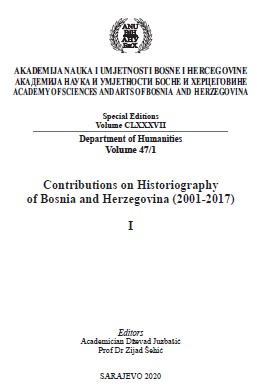Pitanje ustanka 1875–1878. u bosanskohercegovačkoj historiografiji: između historijske istine i multiperspektivnosti
Question of the Uprising of 1875–1878. in Bosnian historiography: between historical truth and multiperspectivity
Author(s): Edin Radušić
Subject(s): Political history, Government/Political systems, Politics and society, 19th Century, The Ottoman Empire, Inter-Ethnic Relations, Politics and Identity
Published by: Akademija Nauka i Umjetnosti Bosne i Hercegovine
Summary/Abstract: Bosnian-Herzegovinian historiography of the 21st century shows that the uprising and the eastern crisis (1875–1878), as part of the great theme of imperialism and nationalism, are phenomena of long duration. During this period, new books and articles appear that elaborate or significantly touch the uprising. The dominant feature of much of this new historiography and its creators is that they were more or less willingly placed in a national context. The central point of historiography on the uprising has been Milorad Ekmečić, who intensively dealt with this thematic framework in the second half of the 20th and the first half of the 21st century. In his more relaxed phase of interpreting historical themes, Ekmečić, in methodological terms, selecting and processing phenomena of long duration, strongly connected the uprising in Bosnia and Herzegovina 1875–1878 not only with previous events (the “Serbian Revolution” and other uprisings of the Balkan Christian peasantry) but also with those that recur at certain intervals until the end of the 20th century. Moreover, in his interpretation, the uprising of 1875–1878, together with other similar events, before and after it, belongs to one whole that is an expression of revolt against the socio-economic system of inequality and division, essentially established by the Ottoman (Islamic) state idea and practice. Established social relations during this period, which ultimately resulted in the division and distrust of members of different religious and national groups, Ekmečić saw as the historical foundations of division and mutual violence in Bosnia and Herzegovina and the Balkans at the end of the 20th century. Such Ekmečić’s approach found fertile ground among some of his historiographical followers, who at scientific conferences and round tables, together with institutional leaders of political, scientific and cultural life in Republika Srpska, strengthened the link between the Bosnian-Herzegovina uprising 1875–1878 and the present. In interpreting the causes of the uprising in the Bosnian-Serbian historiographic circle, Ekmečić’s thesis on the dominant socio-economic causes of the uprising and on agrarian movements as the essence of the national revolution has been largely retained, with some exception in recent interpretations of Bratislav Teinović.
Book: Prilozi o historiografiji Bosne i Hercegovine (2001–2017) I
- Page Range: 99-130
- Page Count: 32
- Publication Year: 2020
- Language: Bosnian, Croatian, Serbian
- Content File-PDF

